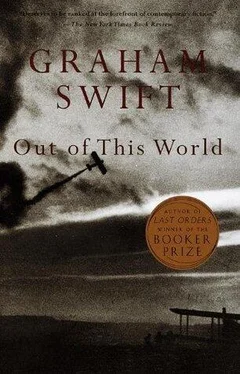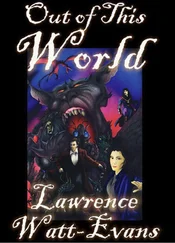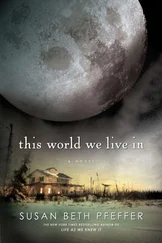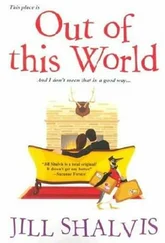Graham Swift - Out of This World
Здесь есть возможность читать онлайн «Graham Swift - Out of This World» весь текст электронной книги совершенно бесплатно (целиком полную версию без сокращений). В некоторых случаях можно слушать аудио, скачать через торрент в формате fb2 и присутствует краткое содержание. Год выпуска: 2012, Издательство: Vintage, Жанр: Современная проза, на английском языке. Описание произведения, (предисловие) а так же отзывы посетителей доступны на портале библиотеки ЛибКат.
- Название:Out of This World
- Автор:
- Издательство:Vintage
- Жанр:
- Год:2012
- ISBN:нет данных
- Рейтинг книги:3 / 5. Голосов: 1
-
Избранное:Добавить в избранное
- Отзывы:
-
Ваша оценка:
- 60
- 1
- 2
- 3
- 4
- 5
Out of This World: краткое содержание, описание и аннотация
Предлагаем к чтению аннотацию, описание, краткое содержание или предисловие (зависит от того, что написал сам автор книги «Out of This World»). Если вы не нашли необходимую информацию о книге — напишите в комментариях, мы постараемся отыскать её.
Out of This World — читать онлайн бесплатно полную книгу (весь текст) целиком
Ниже представлен текст книги, разбитый по страницам. Система сохранения места последней прочитанной страницы, позволяет с удобством читать онлайн бесплатно книгу «Out of This World», без необходимости каждый раз заново искать на чём Вы остановились. Поставьте закладку, и сможете в любой момент перейти на страницу, на которой закончили чтение.
Интервал:
Закладка:
Do you know what winter is like in Greece? They try to pretend it’s not really happening, that there isn’t really such a thing as winter. The wind blows and it rains and everyone shivers for a while. Then the sky clears and goes still and blue. Out come the café tables again. People sit and chatter, their breath steaming. On the trees that line the streets there are little bright balls like miniature suns. Oranges.
I won’t forget that April morning when I looked out of the window on Ippodamou Street and saw the tank in the square below. It was like when I first saw the Parthenon, all floodlit, that night we drove into Athens. I thought: This isn’t really real, this isn’t a real tank. It looked like some clumsy, extinct monster that has somehow turned up in the wrong place and was trying to get out.
The streets were all empty.
You know, Joe went back there in ’74. To ‘clear some things up’. That was the summer Argosy Tours folded. But I didn’t think he had anything more to do with them. And I don’t know how he knew . I mean, about Cyprus and everything. He said it was strange, the whole country was mobilizing, and yet the tourists were still carrying on as normal, buying postcards and getting their sun-tans. He said that almost straight away they started pulling down all those phoenix-and-soldier signs that were the emblem of the Junta. He said he never thought you could feel, see a thrill run through a whole people like that. I had this picture of a breeze running through a field. He was gone three weeks. When he got back he looked so tired. The tired old new world. That’s when I fucked Nick the plumber. We all want Greece in our hearts, don’t we? Blue air and marble Apollos.
Harry
To be happy in Nuremberg! To fall in love in Nuremberg! In that city of guilt and grief and retribution, to think of only one face, one pair of eyes, one body.
Sometimes I wonder, if it had been somewhere else, if it would have happened so quickly, so precipitately. As if there you could do these things, dispense with niceties and preliminaries. Like the German girls, whose English was basic: ‘Kommon, shveetart, less go ficken.’ If we would have walked as we walked that afternoon across the Hauptmarkt, trembling just a little (though the autumn air was mild), with nothing between us save a few words, a few cups of so-called coffee and a mutual rush of desire. (We stopped outside the Frauenkirche: she lifted her head and took those deep, concentrated breaths.) If she would have led me so directly and so artlessly to where she stayed, Küfergasse, number twenty-eight, and I would have heard so soon, like the unfamiliar sound of happiness, like the sound of the future being unveiled without any pious ceremony, the slither of a dress being lifted over newly bought American nylons.
A virgin, for all that. A towel to protect her landlady’s sheets. Why then? Why me? As if she were shutting other, bigger doors than the door of that little dingy room in Nuremberg, behind her.
There was a look you could see in those days in people’s faces. Maybe you could see it especially in Nuremberg. As if their minds had gone on hurriedly ahead, grown up too fast, and their bodies had been left behind. They were waiting for their bodies to catch up with their minds. Or for their minds to go back to their innocent, forgotten bodies.
Küfergasse, achtundzwanzig . I still remember the names of the streets. Burgstrasse, Tetzelgasse, Küfergasse. An archway, two flights of stairs. The room with the yellowed wallpaper and the paler rectangles left by removed pictures (the Führer? Frames for firewood?), where we told each other the story of our lives.
Tobacco. They were all in tobacco. Save the only one who was left now, Uncle Spiro, the scholar, who years ago had packed his bags and gone to study in Athens and, later, England. When she was twelve years old her mother and father had died, vainly trying to beat out the flames that were consuming their tobacco warehouse. Then her two brothers were killed in the early months of the war, and she had passed into the care of her uncle, by now a professional academic and a widower. To avoid starvation, or worse, he had abandoned his apartment in Salonika and they had gone to live during the occupation in his summer house on the island of Thassos.
I said (but this was like a made-up story, a hastily improvised bedtime story, to stop her tears): There was this son who didn’t get on with his father. And this old house in leafy Surrey, with a gravel drive and lawns and an orchard. And wasn’t it funny, but I had had an uncle once who was a scholar too. Of Greek. But he had never (so far as I knew) gone to bed with a Greek woman.
(He had never, so far as I knew, gone to bed with any woman.)
She said, drying her eyes: Was it true that in England everyone took tea at precisely four o’clock? And ate cucumber sandwiches?
The lights from the traffic in Tetzelgasse used to flicker across the ceiling. I still see it. A small sliver appearing in one corner, then quickening, widening. The exact pattern of those cracks in the ceiling.
But had he really sworn never to see me again? And what did he do, to have this big house?
Not so big, I said. I said: He made something. I didn’t want to tell her. I said: Guess. It was like tobacco. It went up in smoke too.
I was a photographer, there to capture on film the face of evil. She was a translator, there to translate and transcribe the evidence of killings, atrocities, burnings, little white Greek villages razed to the ground.
To be happy in Nuremberg. To smile in Nuremberg. To get up and get dressed and go out into the Nuremberg night like a young couple from the country, snatching a few stolen days in some pleasure-loving city.
The photo, not the photographer? Only the picture counts? Does it matter, when the photographer lifts the camera to capture the face of evil, if a voice is chuckling inside him: ‘I am happy, I am in love’?
We were married by an army chaplain on October 14th, 1946, two weeks after the Tribunal passed sentence. She wrote to her uncle. He would give his blessing, no question. (A real Englishman!) After that, she was always ‘going’ to see him — when the fighting was over in Greece, when he was settled again in Salonika, when Sophie was a bit older.
I wired to my paper — impudently, since I had only been employed by them for six months — to request a week’s ‘matrimonial leave’. We had little money, but I used my press credentials to ‘borrow’ a car and a spare jerrycan of petrol, and we drove, through Ulm and round Lake Constance, to Switzerland, feeling as we explained ourselves to the guards at the border, like escapees. To neutral Switzerland, where the white peaks under fresh autumn snow really did seem like the icing on some gigantic, never-to-be-eaten cake, and the wooden chalets nestling on the slopes really did seem like life-size musical boxes that had dropped from the sky. And Herr and Frau Hebinger, stolid proprietors of the Pension Hirsch near Lucerne, who gave the impression that they truly didn’t know, cut off behind that veil of mountains, what had been going on in the world, and who believed that Anna, the first Greek in their guest-book, must be, in these northern climes, continually cold, became almost fond, almost paternal, their dour faces cracked, when I explained that the last thing, the very last thing my new wife was, was cold.
To dance in Nuremberg! The ‘Arkadien’ (who gave it that name?) in Lorenzerstrasse. A pianist, a drummer, a guitarist, a trombonist. And the people getting up to recover their lost bodies on the little dance floor. I should have photographed those faces in the ‘Arkadien’, veiled in smoke and uncertainty. The faces that said, Is it all right now, will it ever be all right, to lead lives of our own?
Читать дальшеИнтервал:
Закладка:
Похожие книги на «Out of This World»
Представляем Вашему вниманию похожие книги на «Out of This World» списком для выбора. Мы отобрали схожую по названию и смыслу литературу в надежде предоставить читателям больше вариантов отыскать новые, интересные, ещё непрочитанные произведения.
Обсуждение, отзывы о книге «Out of This World» и просто собственные мнения читателей. Оставьте ваши комментарии, напишите, что Вы думаете о произведении, его смысле или главных героях. Укажите что конкретно понравилось, а что нет, и почему Вы так считаете.












